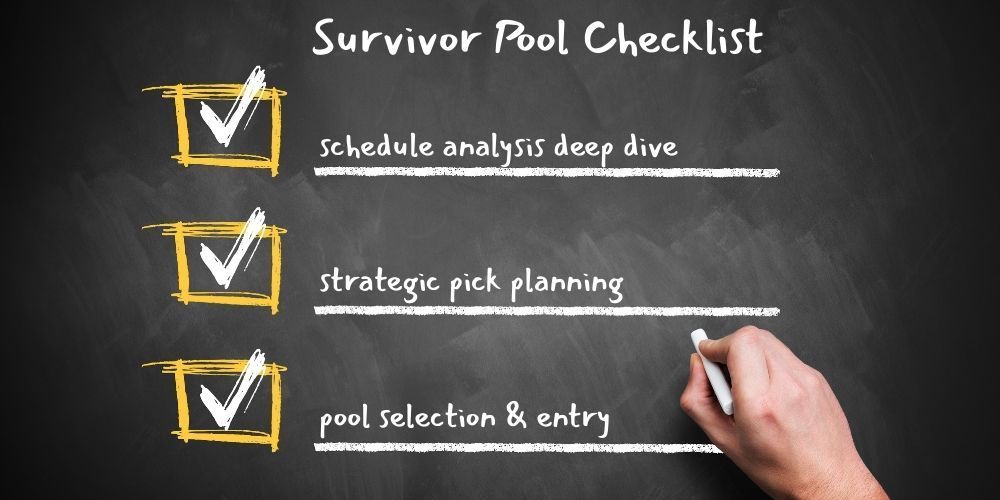The Psychology of Survivor Pools: Outsmarting Your Opponents
William Flaiz • July 9, 2025
Hey there, sports fans! If you’ve ever joined a survivor pool, you know it’s more than just picking winning teams. It’s a game of strategy, psychology, and a little bit of guts. Whether you’re new to survivor pools or a seasoned player looking to up your game, this post will dive into the mind games behind survivor pools, explain how they work, share some clever strategies to outsmart your opponents, and give you practical examples to bring it all together. Let’s get started!

What Is a Survivor Pool?
A survivor pool, sometimes called an eliminator or knockout pool, is a fun and intense game where you pick one team each week in a sports league (usually the NFL) to win their game outright—no point spreads involved. The catch? You can only pick each team once during the entire season, and if your team loses, you’re out of the pool. The last person standing wins, often claiming a big prize.
The beauty of survivor pools is their simplicity, but don’t let that fool you. They’re as much about outthinking your opponents as they are about picking winners. It’s like a high-stakes chess match where you’re trying to predict not just the game outcomes but also what everyone else in your pool is thinking.
How to Play a Survivor Pool
Here’s a quick rundown of how survivor pools work:
- Join a Pool: You sign up through an online platform, an office pool, or with friends. Everyone pays an entry fee, which goes into the prize pot.
- Pick One Team Each Week: Before the games start (usually NFL games on Sundays), you choose one team you think will win their game that week. No spreads, just a straight-up win.
- One-and-Done Rule: You can only pick a team once all season. So, if you pick the Kansas City Chiefs in Week 1, you can’t pick them again.
- Survive or Bust: If your team wins, you move on to the next week. If they lose, you’re eliminated (unless your pool allows a second chance or “buy-back” option).
- Last One Standing Wins: The game continues until only one player remains, or until the season ends, and the pot is split among survivors.
Some pools have variations, like allowing one loss before elimination or requiring picks for multiple teams in later weeks, but the core idea stays the same: survive longer than everyone else.
The Psychology Behind Survivor Pools
Survivor pools aren’t just about knowing football stats or who’s got the best quarterback. They’re about getting inside the heads of your opponents. Why? Because everyone in your pool is picking from the same games, and if too many people pick the same team, it doesn’t give you an edge. The real trick is figuring out what everyone else is likely to do and then doing something different to stand out.
Why Mind Games Matter
Imagine you’re in a pool with 100 players, and 90 of them pick the same team in Week 1. If that team wins, you’re still in, but so are 90 other people—no advantage gained. But if that team loses, you’re one of the 10 left standing, and you’re suddenly in a great spot. This is where psychology comes in: you want to predict the popular picks and avoid them when it makes sense, taking calculated risks to separate yourself from the pack.
Understanding the Herd Mentality
Most players in survivor pools follow a “safe” strategy, picking teams that look like sure bets—think teams with great records, home-field advantage, or a hot streak. This herd mentality makes sense because nobody wants to lose in Week 1. But it also creates opportunities for savvy players. If you can guess which teams are the “obvious” picks, you can choose a less popular team that still has a good chance of winning, setting yourself up for a big advantage if the favorite flops.
The Contrarian Approach
Being contrarian doesn’t mean picking a terrible team just to be different. It means finding value in teams that others overlook. For example, if everyone’s picking a heavy favorite like the Philadelphia Eagles against a weak opponent, you might pick a solid underdog like the Miami Dolphins playing a close game. If the Dolphins win and the Eagles lose, you’ve outsmarted the majority and thinned out the competition.
Strategies to Outsmart Your Opponents
Here are some practical tips to use psychology and strategy to get an edge in your survivor pool:
- Predict Popular Picks: Look at betting odds, sports talk shows, or even social media buzz on platforms like X to see which teams are getting hyped. If everyone’s raving about a team, they’re likely a popular pick. Consider going against the grain if you spot a safer alternative.
- Save Strong Teams for Later: Don’t burn your best teams (like perennial winners) early in the season. If you use up all the “easy” picks in the first few weeks, you’ll be stuck with risky choices later when the field is smaller.
- Look at Game Schedules: Some weeks have more “obvious” matchups than others. If Week 1 has a clear favorite but Week 2 looks tricky, save the favorite for Week 2 when more people might struggle.
- Consider Your Pool Size: In a small pool (like 10 people), you can afford to take risks early because you don’t need to outlast hundreds. In a big pool (100+ players), play it safer early to survive the initial chaos, then get bold when the field shrinks.
- Watch for Trap Games: These are matchups where a “sure thing” team might actually lose—like a favorite playing on the road after a tough game or against a scrappy underdog. Picking against the favorite in these spots can be a game-changer.
Example Scenarios
Let’s walk through a couple of scenarios to see these strategies in action.
Scenario 1: Week 1 Chaos
It’s Week 1, and you’re in a 50-person pool. The Pittsburgh Steelers are playing the Washington Commanders, and the Steelers are a huge favorite—let’s say 80% of your pool picks them. You notice the Denver Broncos are playing a close game against the Seattle Seahawks, but Denver’s got a strong defense and a decent chance to win. You pick Denver.
Outcome: The Steelers lose in a shocking upset (it happens!), and 40 players are knocked out. Denver wins, so you’re still alive with only 10 others. By avoiding the herd, you’ve given yourself a massive edge.
Scenario 2: Saving a Strong Team
It’s Week 3, and the Kansas City Chiefs are a lock to beat a struggling team. Everyone’s tempted to pick them, but you notice Week 4 has no clear favorites. You decide to pick the Buffalo Bills, who have a solid matchup, and save the Chiefs for Week 4.
Outcome: The Bills win, and you survive Week 3. In Week 4, when others are scrambling to find a good pick, you confidently choose the Chiefs, who cruise to victory. By planning ahead, you’ve avoided a risky week and kept yourself in the game.
Scenario 3: The Trap Game
In Week 5, the Dallas Cowboys are heavy favorites against a weak opponent, and 70% of your pool picks them. But you know the Cowboys are on the road after a tough divisional game, and their opponent has a sneaky-good defense. You pick the New York Giants in a closer matchup instead.
Outcome: The Cowboys stumble, losing in a close game, and most of your pool is eliminated. The Giants pull through, and you’re one of the few left standing. Your contrarian pick paid off big time.
Wrapping It Up
Survivor pools are a thrilling mix of sports knowledge, gut instinct, and psychological warfare. By understanding how your opponents think, predicting their picks, and using contrarian strategies, you can gain a huge edge. It’s not just about picking winners—it’s about outsmarting everyone else in the pool. So, study the matchups, think one step ahead, and don’t be afraid to take a calculated risk. You might just be the last one standing, holding that prize pot with a big grin.
Got a survivor pool story or strategy of your own? Drop it in the comments or share it on X—I’d love to hear how you’re outsmarting your poolmates!
What makes survivor pools different from other sports betting games?
Survivor pools are unique because you only pick one team per week to win outright, and you can’t pick the same team twice. Unlike fantasy football or spread betting, it’s all about surviving each week without a loss, making strategy and psychology key to outlasting your opponents.
How can I predict which teams others will pick in my survivor pool?
Check betting odds, sports news, and social media platforms like X to see which teams are getting a lot of attention. Popular teams are often heavy favorites or have high-profile players. You can also ask friends in your pool for their “gut” picks to gauge the crowd’s thinking.
Is it better to play it safe or take risks in a survivor pool?
It depends on your pool size and the week. In large pools, play safer early to survive the initial eliminations, then take calculated risks when the field shrinks. In smaller pools, you can afford to be bolder early on. Always balance risk with the likelihood of a team winning.











